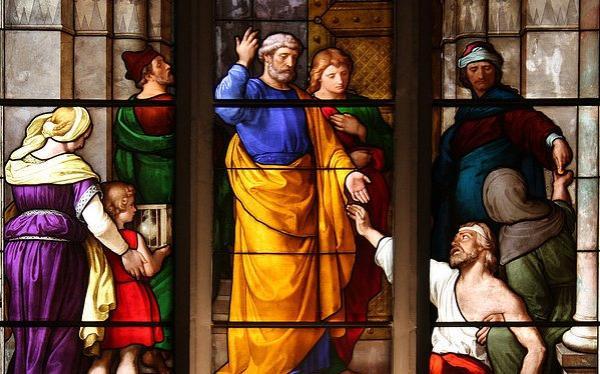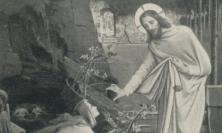One New Testament book is reserved for Easter Day and the following fifty days until Pentecost, and is never otherwise read publicly in Catholic Sunday or weekday liturgies. This book is The Acts of the Apostles. Peter Edmonds SJ invites us to spend some time exploring its background and character as we attempt to grasp the significance of Easter and deepen the peace, hope and joy which the season offers.
Luke the Person
First it is important to recognise the Acts of the Apostlesas a personal work. It is personal in the sense that the author introduces himself in the opening verse (1:1). He is the evangelist who wrote the Gospel of Luke. He introduced that gospel by defining his programme and aim: he wanted to give his hearers and readers a solid foundation for their Christian commitment by giving them a version of the story of Jesus which spoke to their situation and needs. At the beginning of Acts, he presumes his readers’ familiarity with all that Jesus ‘did and taught’ (1:1 [all references to Acts unless otherwise stated]). It is personal too in being addressed to an individual named Theophilus. This word can either mean ‘Lover of God’ or ‘Loved by God’. It could refer to a real person, or it could be a general term describing Christians who lived in the great urban centres of the Mediterranean world which were wedded to Greek culture and governed by Roman authority. Both gospel and Acts are personal in a third sense: they are each concerned with persons and personal relationships. A reader who notes the individuals who occur in their stories will end up with a very long list which will contain more saints than sinners, more heroes than villains.
Tradition has identified this Luke with the Luke referred to three times in the Pauline letters (Philemon 24; Colossians 4:14; 2 Timothy 4:11). These texts together paint a portrait of someone who embodied the virtues of friendship and fellowship, hard work and perseverance, healing and compassion. As a younger man, he had been a companion of Paul in some of the missionary journeys he describes in Acts (16:10-17). As we read through his Acts of the Apostles, composed years after those journeys, we grow acquainted with an author whose qualities reflect those of a historian, a theologian and a pastor.
Luke the Historian
When we call him a historian, we do not mean that Luke was a historian in the modern sense. He was able to tell a good story which brings to life individuals and events, but his knowledge was limited by the sources and traditions available to him. Nonetheless the information he gives is useful background to the letters which St Paul had written thirty years before. We understand Paul’s letters to the Thessalonians, the Corinthians and the Ephesians all the better for knowing the account Luke gives in Acts. His 15th chapter concerning the so-called Council in Jerusalem is a valuable supplement to what we read about early Christian controversies in Paul’s letter to the Galatians. His accounts of Paul’s encounters with Roman authorities in Philippi and Corinth inform us of the sort of thing that occurred when the Christian movement met with Roman power. Paul’s experiences in Lystra (14:8), Athens (17:16) and Ephesus (19:28) give us a taste of the atmosphere of idolatry and polytheistic worship of the Greek world for which Luke wrote. Luke may not tell us, or even know, how Christianity reached Rome, but he does tell us what happened when a particular individual, Paul, arrived there (28:16).
Luke the Theologian
Luke’s Acts of the Apostlesis also a work of theology. The theology we find in it may not be of the depth which Paul provides in his Letters or John in his gospel, but it is a sound theology which offers an appropriate guide to Christians in that world, whether they were of gentile background with their multiple idols and many gods, or of Jewish ancestry who valued the revelation of their scriptures. Out of several possible topics, we comment on what Luke has to tell us about the identity of God, about the grace of God and about sacraments which continue to nourish the Church in our own day.
The Identity of God
Luke helps us establish the identity of the God whose presence is presumed throughout Acts. This God is the God of Abraham, Isaac and Jacob (3:13). He is the Father who keeps his promises (1:4) and who on Pentecost Day sends the Holy Spirit from heaven to empower the bereaved followers of his Son (2:1). Paul told the Lycaonians that God was a ‘living God who made the heaven and the earth and the sea’ (14:15); he told the Athenians that he was the one in whom we ‘live and move and have our being’ (17:28). In a time of crisis, the Christians in Jerusalem addressed this God in prayer as ‘Sovereign Lord’ (4:24).
As for the Son, he was the Lord Jesus (1:21), the same Saviour, Christ and Lord of whom the angels spoke to the shepherds at his birth (Luke 2:11), but he was also the one whom Stephen, as he was being stoned to death, saw standing as Son of Man at the right hand of God (7:55). He was the one God raised up (2:24, 32), the Holy and Righteous one, the Author of Life (3:14-15). From his place in heaven, at times he makes his voice heard on earth; he called out to Paul on the road to Damascus (9:5) and encouraged him in his troubles in the city of Corinth (18:9). He was the one of whom the prophets of old spoke: a special illustration of this is provided by Philip when he explained to a bewildered Ethiopian how Isaiah’s description of the suffering servant of the Lord applied to ‘the good news about Jesus’ (8:35). As to the future, the two men who appeared to the disciples as Jesus was taken up to heaven, promised that, ‘This Jesus...will come in the same way as you saw him go into heaven’ (1:11).
The main means by which God expressed himself in Acts was through the Holy Spirit. The coming of the Holy Spirit on Pentecost day (2:1) was marked by a mighty wind and tongues of fire, language reminiscent of God giving the Law to Moses at Mount Sinai (Exodus 19:16-19; 1 Kings 19:11-13). This Spirit was present with the Church; the decree of the Jerusalem council begins, ‘it has seemed good to the Holy Spirit and to us to impose on you no further burden’ (15:28). This Holy Spirit was not just an external force; Stephen, the first martyr, is typical of those said to be ‘full of faith and the Holy Spirit’ (6:5). So dominant is the Holy Spirit in the Acts that it is mentioned 56 times.
The Grace of God
Besides teaching about the identity of God, Luke has much to say about the power of the grace of God and the initiatives God takes in forming witnesses for the mission. The experiences of Peter and Paul demonstrate this most dramatically. When Jesus was on trial, Peter denied three times that he ever knew him, but Jesus did not abandon him. After the resurrection, the Lord appeared to him (Luke 24:34). He resumed his leadership of the Twelve in arranging for the election of Matthias (1:15) and, inspired by the Holy Spirit, spoke out with great effect to the crowds on Pentecost day (2:14-36). Nonetheless he needed a special heavenly vision and voice to persuade him to eat what appeared to be unclean, which led to his acceptance of the Gentile Cornelius. So important are the truths contained in this story that it is told twice (10:9-17; 11:4-10).
The second part of the Acts is dominated by the story of Paul. He turned from a life in which he made Christians suffer to a life in which he himself was to suffer for the sake of the name of Jesus. In response to the divine voice of Jesus speaking from heaven and the human voice of Ananias, he was baptised, spent time with Christian disciples and became a proclaimer of Jesus as ‘the Son of God’. Luke gives us three accounts of this event, similar indeed in outline, but each with a particular emphasis. From the first, we learn the power of the grace of God in transforming a persecutor into a chosen instrument of Christ (9:1-19). In the second, we notice how the narrative has a particular Jewish flavour, typified by the description of Ananias as a ‘devout man according to the law’ (22:1-21) and the fact that Paul gets his mission while at prayer in the Jerusalem temple; whereas in the third it is the mission of Christianity to every nation, not just Israel, which comes across. Thus Paul’s speech concludes with his prayer that not only King Agrippa but all who listened to him might become as he was (26:2-29).
There are many other instances of the triumph of the grace of God in Acts. A crowd of 3000 in Jerusalem is converted by Peter at Pentecost (2:41); the entire family of the unnamed jailer in Philippi is baptised by Paul (16:33); the Ethiopian eunuch, who had been reading Isaiah, is an individual who accepts baptism from Philip (8:31). For Luke, as for Paul, God was a ‘living and true’ God (1 Thessalonians 1:9), pouring out his grace on all persons and places.
The Sacraments
In Christian history, it is the sacraments that have been recognised as channels of the grace of God. The Acts of the Apostlesassists us in understanding something about Baptism and Eucharist. The repeated mention of baptism in Acts reminds us of the antiquity of this sacrament. When the crowds on Pentecost day asked Peter what they should do, he replied that they should repent and be baptised (2:38). Obviously this practice was well known to Luke’s first readers, although he never explains the significance of baptism as did Paul, who likened it to going down into the tomb with Christ (Romans 6:3), or John who compared it to being reborn from above (John 3:7). It is also in Acts that the Church finds the origins of the Sacrament of confirmation: the relevance of the outpouring of the Holy Spirit on the first disciples at Pentecost (2:4), a similar outpouring in response to their prayer under persecution (4:31), and again in Caesarea after the conversion of Cornelius, is obvious (10:44).
Likewise we find a number of references in Acts to the ‘breaking of bread’, almost certainly a reference to the Eucharist. The reader knows all about this from Luke’s account of the Last Supper (Luke 22:19) and from his description of the meal Jesus took with the two disciples on the Emmaus road, when ‘he had been known to them in the breaking of bread’ (Luke 24:35). In Acts, Luke did not need to elaborate on the meaning of this ‘breaking of bread’. He records that the Christians in Jerusalem continued the practice (2:42). So did Paul in Troas when the community met ‘to break bread’ (20:7,11) and in the presence of 275 fellow passengers in a storm on his voyage to Rome (27:35). Through this ‘breaking of bread’, the Lord became especially present to them.
Luke the Pastor
Luke was no academic theologian. He was a pastor, anxious to encourage and equip his readers with the ideals personified in the words and deeds of Jesus. He had done this in his gospel by portraying Jesus himself as their primary model. He was the exemplar of one who prayed (Luke 3:21), was ‘filled with the power of the Spirit’ (Luke 4.14) and ‘preached the good news to the poor’ (Luke 4:18). These first readers would have lived in the great cities of the Roman Empire, such as those to whom Paul addressed his letters. Luke’s method is different in that he teaches through narrative and drama. We find his vision of community life expressed in his descriptions of one community in particular which he portrays as a model for others, the community in Jerusalem. Three times he summarises the manner of their lives together (2:42-47; 4:32-35; 5:12-16), introducing these summaries with what we might call the ‘four marks of the Church’.
First, they devoted themselves to the apostles’ teaching. Obviously they respected those whom Jesus had chosen as the Twelve. Because Judas had apostasised, Luke is careful to note how they took trouble to replace him (1:26). In fact we hear little of those apostles apart from Peter and John, who play a prominent part in the first part of the story. The speeches that Peter makes are our main source for the apostolic teaching. In each speech, he repeats the core facts of the gospel, namely the suffering, death and resurrection of Jesus. He quotes scriptures from the Old Testament frequently, thereby satisfying the curiosity of those who wonder which texts Jesus explained to the two disciples on the Emmaus road which he said were about himself (Luke 24:27). Also as a good pastor, Peter commented on the particular situation in which his audience found themselves, laying out a path for its solution (2:14-40; 3:12-26; 4:8-12; 10:34-43). Other figures, even though they are not called apostles, like Stephen (7:2-53) and Paul (13:17-41; 14:15-17; 17:16-31), consolidate and expand this teaching of Peter in speeches of their own. Luke’s message for his own day, and ours, is to pay attention to such teaching.
Second, they devoted themselves to fellowship. This was taken to extremes in that they shared everything in common and made sure that there were no poor among them. A Greek word repeated ten times in the Acts of the Apostlesis ‘homothumadon’ which can be translated as ‘of one mind’ (1:14, etc). Even if at times there were disputes, and the most obvious of these was the argument about the admission of Gentiles into the Church without demanding an observance of the Mosaic Law, such disputes were settled in an amicable and orderly manner. The procedures followed in this so-called ‘Jerusalem Council’, are a model for all such meetings (15:1-35).
Thirdly, they were devoted to the ‘breaking of bread’. We have already referred to this in our discussion of Luke as theologian. In considering this, it is useful to refer to the description that Paul offers in his first letter to the Corinthians which is the earliest account of all (1 Corinthians 11:17-32).
Fourthly, they devoted themselves to prayer. Acts begins with the disciples, the mother of Jesus and ‘the brothers’ of Jesus all devoting themselves to prayer (1:14). After Pentecost, Peter and John went to the temple at the hour of prayer (3:1). Luke’s Gospel had stressed the constant habit of prayer that marked the life of Jesus (Luke 3:21). The disciples had asked Jesus to teach them to pray (Luke 11:1), and we can be sure that they took the trouble to teach their converts to do the same. An example of public prayer in Acts is the prayer for boldness made after the release of Peter and John from prison (4:24). Another ‘prison’ prayer is that made by Paul and Barnabas in jail in Philippi. This was prayer with hymns too; the other prisoners listened to them. They made no complaints, but benefited because the prayer was answered and all their chains were unfastened (16:25).
The Beautiful Gate
The Acts of the Apostles contains many edifying and entertaining stories. One concerns a man lame from birth who each day was deposited at the Beautiful Gateof the Jerusalem temple. Peter and John passed by and as they did so, looked at the man intently, saying, ‘I have no silver or gold, but what I have I give you; in the name of Jesus Christ of Nazareth, stand up and walk’ (3:6). May these reflections on Luke as person, historian, theologian and pastor allow the Acts of the Apostles, to which we listen every time we attend the Eucharist during the Easter season,to serve as a Beautiful Gatewhich will lead its readers to a more profound understanding of Christ and the early years of Christianity.
Peter Edmonds SJ is a tutor in Biblical Studies at Campion Hall, University of Oxford and author of Rediscover Jesus, a pilgrims’s guide to the land, the personalities and the language of Luke (Kevin Mayhew, 2007).
![]() ‘How to read the Gospel of Luke’ by Peter Edmonds SJ on Thinking Faith.
‘How to read the Gospel of Luke’ by Peter Edmonds SJ on Thinking Faith. ![]() Rediscover Jesus, a pilgrims’s guide to the land, the personalities and the language of Luke by Peter Edmonds SJ
Rediscover Jesus, a pilgrims’s guide to the land, the personalities and the language of Luke by Peter Edmonds SJ






